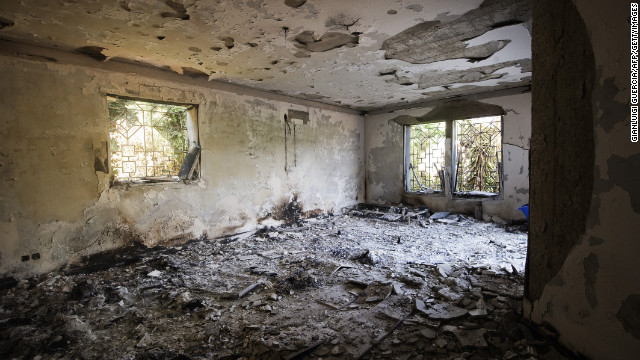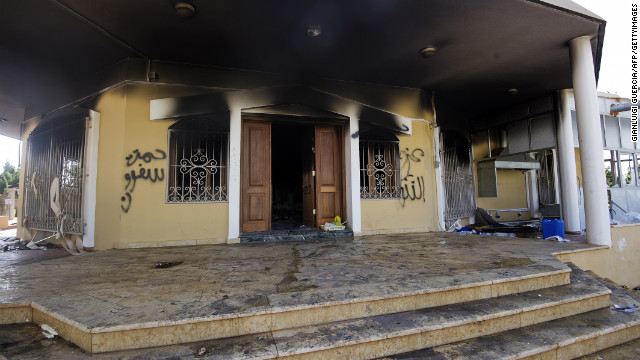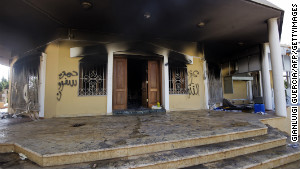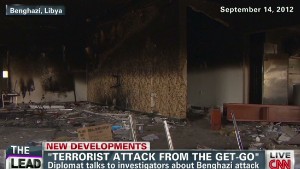Former deputy chief of mission in Libya: U.S. military assets told to stand down
updated 6:13 AM EDT, Tue May 7, 2013

Whistleblower to testify on Benghazi
STORY HIGHLIGHTS
- Former U.S. official in Libya wonders why no plane was sent during the Benghazi attacks
- The official, Greg Hicks, and others will testify before a House committee Wednesday
- Planes at a base in Italy would not have made it for hours, top officials have said
- Hicks' comments come from a transcript of his interview with investigators in April
Specifically, Greg Hicks
wondered why the military did not send a plane into Libyan airspace as a
show of force, and why four U.S. Special Operations soldiers were not
permitted to travel to Benghazi on a Libyan plane the morning of
September 12.
The House Oversight and
Government Reform Committee will hear from Hicks and others in a
Wednesday hearing on the Benghazi tragedy, which ended in the deaths of
four Americans -- U.S. Ambassador Chris Stevens, information officer
Sean Smith, and former Navy SEALs Tyrone Woods and Glen Doherty.
The committee's chairman,
Rep. Darrell Issa, told CNN Monday that Hicks, who was the U.S. deputy
chief of mission in Libya at the time of the attack, "is going to
testify that from the get-go, he knew this was a terrorist attack and
communicated that to the White House, to the State Department, to anyone
that would listen before, during, and after."
Issa asserted that the
Obama administration's "talking points" afterward -- specifically the
statements by the U.S. ambassador to the United Nations, Susan Rice,
which did not acknowledge that it was a terrorist attack, "had an effect
on our diplomatic relations" with Libya and "was an unnecessary error."
 Photos: Attack on U.S. Consulate in Libya
Photos: Attack on U.S. Consulate in Libya
 U.S. team ordered not to enter Benghazi
U.S. team ordered not to enter Benghazi
 Benghazi: Terrorist attack from the start
Benghazi: Terrorist attack from the start
He said he wants to know
"who made the decision to change the talking points in a way that caused
the American people to be lied to."
Issa denied that the
hearing is a Republican effort to discredit a Democratic administration,
and asked, "Why aren't the Democrats just as upset that we didn't do
all we could do to save American lives?"
Beyond the Benghazi
attack, he said, he expects the hearing to shed light on a failing war
on terror, one in which Syria is erupting, one in which Egypt is
erupting, one in which Boston is the result of terrorists, of Islamic
extreme groups, and I think that's the message the American people want
to hear is, tell us the truth, do what it takes to have us be protected,
don't tell us things aren't terrorist attacks when they are."
Hicks spoke to investigators on April 11 of this year, and excerpts of transcripts of the interview were obtained by CNN.
"The Libyans that I
talked to, and the Libyans and other Americans who were involved in the
war have told me also, that Libyan revolutionaries were very cognizant
of the impact that American and NATO airpower had with respect to their
victory," Hicks said.
"They are under no
illusions that American and NATO airpower won that war for them. And so,
in my personal opinion, a fast mover flying over Benghazi at some
point, you know, as soon as possible might very well have prevented some
of the bad things that happened that night."
Hicks went on to say he
believes "if we had been able to scramble a fighter or aircraft or two
over Benghazi as quickly as possible after the attack commenced" --
around 9:30 that night -- "I believe there would not have been a mortar
attack on the annex in the morning because I believe the Libyans would
have split. They would have been scared to death that we would have
gotten a laser on them and killed them."
The former deputy chief
of mission suggested that the Libyan government would have granted the
United States permission to fly the planes.
"I believe that the
Libyans were hoping that we were going to come bail them out of this
mess," Hicks said. "And, you know, they were as surprised as we were
that ... the military forces that did arrive only arrived on the evening
of September 12th."
Rep. Jason Chaffetz,
R-Utah, a member of the committee, tells CNN that "military personnel
were ready willing and able, and within proximity, but the Pentagon told
them they had no authority and to stand down."
Issa added that the
personnel "may not have arrived in time to save lives, but at the time
the decision was made, the decision was wrong."
In February, the Joint
Chiefs chairman, Gen. Martin Dempsey, was asked by Sen. Kelly Ayotte,
R-New Hampshire, why F-16s at Aviano Air Base in Italy weren't deployed
to Benghazi that night.
"This is the middle of
the night now, these are not aircraft on strip alert," Dempsey said.
"They're there as part of our commitment to NATO and Europe. And so, as
we looked at the time line , it was pretty clear that it would take up
to 20 hours or so to get them there. Secondly, senator, importantly, it
was the wrong tool for the job."
Then-Secretary of
Defense Leon Panetta testified that "unfortunately, there was no
specific intelligence or indications of an imminent attack on U.S.
facilities in Benghazi. And frankly, without an adequate warning, there
was not enough time given the speed of the attack for armed military
assets to respond.
"That's not just my view
or General Dempsey's view. It was the view of the Accountability Review
Board that studied what happened on that day," he added.
"This is not 9/11,"
Panetta said in a February interview on CNN's "State of the Union." "You
cannot just simply call and expect within two minutes to have a team in
place. It takes time. That's the nature of it. Our people are there,
they're in position to move, but we've got to have good intelligence
that gives us a heads up that something's going to happen."
Hicks said that around
10 p.m. on the night of the first attack, he was at the U.S. Embassy in
Tripoli talking to State Department officials in Washington, regional
security officer John Martinec at the U.S. Embassy, defense attache Lt.
Col. Keith Phillips and others.
Phillips was reaching
out to officials with the Libyan Ministry of Defense and to the chief of
staff of the Libyan Armed Forces, as well as officials with the Joint
Staff and the U.S. Africa Command.
Hicks recalled asking Phillips, "Is there anything coming?"
He said Phillips replied
"that the nearest fighter planes were Aviano, that he had been told
that it would take two to three hours to get them airborne, but that
there were no tanker assets near enough to support a flight from
Aviano."
There was one team that headed from Tripoli to Benghazi, arriving at around 1:15 a.m., Hicks said.
Phillips, Hicks
recalled, "worked assiduously all night long to try to get the Libyan
military to respond in some way." The Libyan prime minister called Hicks
and told him that the U.S. ambassador had been killed, after which "the
Libyan military agreed to fly their C-130 to Benghazi and carry
additional personnel to Benghazi as reinforcements."
Hicks said that four
U.S. Special Forces troops in Tripoli -- led by the leader of the U.S.
Special Operations Command Africa, SOCAfrica -- planned to hitch a ride
on the Libyan plan to travel to Benghazi to help.
"We fully intended for
those guys to go, because we had already essentially stripped ourselves
of our security presence, or our security capability, to the bare
minimum," Hicks recalled.
But the four were informed by someone with SOCAfrica that they didn't have the authority to go, Hicks said.
"So Lt. Col. Gibson, who
is the SOCAfrica commander, his team, you know, they were on their way
to the vehicles to go to the airport to get on the C-130 when he got a
phone call from SOCAfrica which said, 'you can't go now, you don't have
authority to go now,'' Hicks said. "And so they missed the flight."
"They were told not to
board the flight, so they missed it," Hicks said. "I still remember Col.
Gibson, he said, 'I have never been so embarrassed in my life that a
State Department officer has bigger balls than somebody in the
military.' A nice compliment."
The C-130 left between 6
and 6:30 a.m., so the four Special Forces troops would not have arrived
in time to fend off the 5:15 a.m. attack on the CIA annex in Benghazi.
Hicks said he recalled
asking Phillips again if any military help was coming. "The answer,
again, was the same as before. It's too far away, there are no tankers.
... There is nothing that could respond. ...
"I guess they just didn't have the right authority from the right level," Hicks recalled.
Panetta, in his February
testimony defending officials' actions, said, "The bottom line is this,
that we were not dealing with a prolonged or continuous assault, which
could have been brought to an end by a U.S. military response, very
simply, although we had forces deployed to the region. Time, distance,
the lack of an adequate warning, events that moved very quickly on the
ground prevented a more immediate response.
"Despite the uncertainty
at the time, the Department of Defense and the rest of the United
States government spared no effort to do everything we could to try to
save American lives. Before, during and after the attack, every request
the Department of Defense received we did, we accomplished."
No comments:
Post a Comment